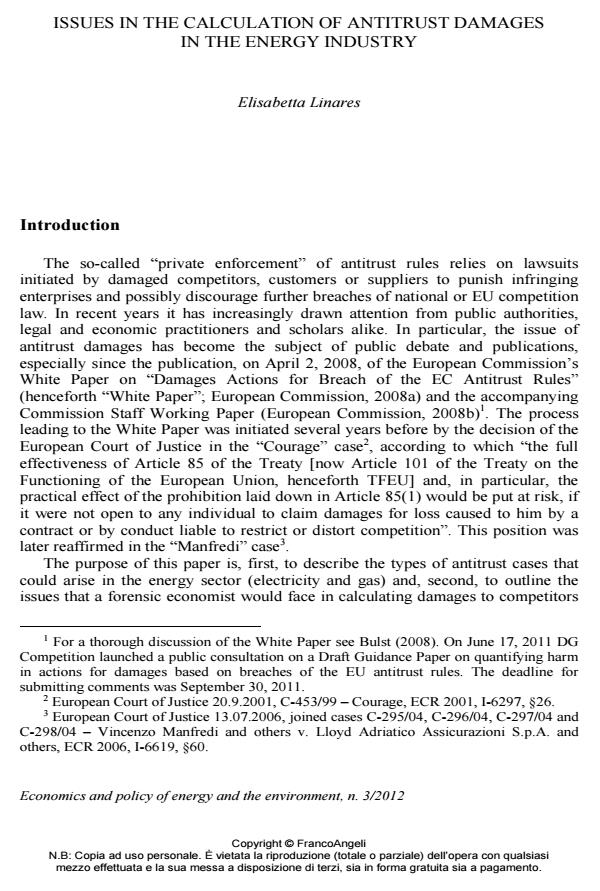Issues in the calculation of antitrust damages in the energy industry
Journal title ECONOMICS AND POLICY OF ENERGY AND THE ENVIRONMENT
Author/s Elisabetta Linares
Publishing Year 2012 Issue 2012/3
Language Italian Pages 20 P. 155-174 File size 655 KB
DOI 10.3280/EFE2012-003010
DOI is like a bar code for intellectual property: to have more infomation
click here
Below, you can see the article first page
If you want to buy this article in PDF format, you can do it, following the instructions to buy download credits

FrancoAngeli is member of Publishers International Linking Association, Inc (PILA), a not-for-profit association which run the CrossRef service enabling links to and from online scholarly content.
In recent years, the "private enforcement" of antitrust law, through the attempt by private parties (usually harmed competitors or consumers) to recover damages in court, has been increasingly gaining attention in Europe. This paper focuses on two particular regulated network industries (electricity and gas). The purpose of this essay is, first, to describe the types of antitrust cases that could arise in the energy industry and, second, to outline the issues that a forensic economist would face in calculating damages to competitors or other parties in these cases. The identified anti-competitive practices range from the delay or the outright denial of access to major gas transportation pipelines (or the refusal to expand their capacity), unfair tariffs for the use of gas transportation networks and capacity hoarding at regasification terminals or in other gas import infrastructure, to the delayed provision of reliable information needed for customer switching and/or to allow a new entrant to plan its electricity and gas purchases and thus minimize imbalance charges. These practices might entail actual monetary loss (damnum emergens) due, for instance, to; higher energy costs for final consumers; sunk costs incurred by competitors to start import or sales activities; noncost- reflective tariffs for access to gas import or transportation infrastructure; excessive imbalance charges and transmission fees; high costs sustained by traders to purchase electricity or gas for resale. Moreover, they may entail lost profits and foregone cash flows (lucrum cessans) due, for instance, to: definitive loss of customers; inability to serve or invoice energy consumers in a given period; lack of access to entire segments of the electricity or gas markets.
Keywords: Energy, Electricity, Gas, Antitrust, Damages
Jel codes: L42, L49, L94, L95
Elisabetta Linares, Issues in the calculation of antitrust damages in the energy industry in "ECONOMICS AND POLICY OF ENERGY AND THE ENVIRONMENT" 3/2012, pp 155-174, DOI: 10.3280/EFE2012-003010